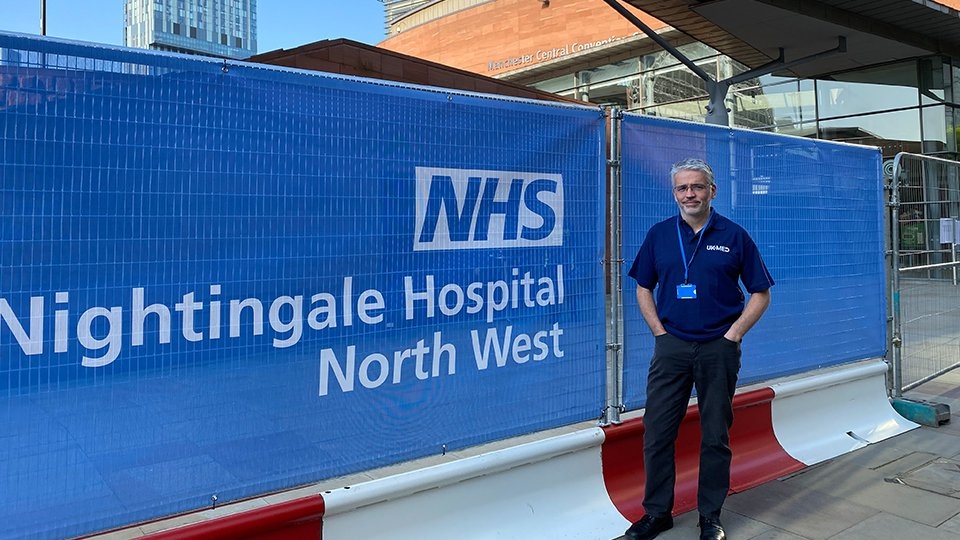Nurse who tackled Ebola now spearheading virus response at Manchester Nightingale hospital
Date published: 20 April 2020

David Anderson pictured outside NHS Nightingale Hospital North West
A nurse has told how his experiences tackling an Ebola outbreak in Sierra Leone are helping him now spearhead the battle against coronavirus at the newly-opened Manchester field hospital.
David Anderson has worked on UK aid responses around the world and encountered terrifying scenes when he was deployed to Sierra Leone to assist with the world’s worst Ebola outbreak in December 2014.
The 51-year-old has returned from preparing South Africa for its COVID-19 response with a UK Government-funded Emergency Medical Team to take on a role as Director of Quality and IPC at NHS Nightingale Hospital North West.
On Friday, Health Secretary Matt Hancock opened the 648-bed facility which is up and running just two weeks after work began on it at the Manchester Central Convention Centre.
David – seconded from his job as a Humanitarian Health Advisor with the UK-Med charity - believes that expertise gained from dealing with the West Africa Ebola epidemic in 2014-2015 will prove crucial in getting on top of COVID-19.
He explained: “Ebola had a mortality rate of 80 per cent when I arrived in Sierra Leone and there were some horrendously dark days.
“I have had the privilege of working around the world in many different contexts with some special individuals and teams, although, I never believed my outbreak experience gained with UK-Med would be required in the UK.
“Working at NHS Nightingale North West has been one of the most spectacular examples of teams from all sectors working together to deliver, in the shortest of timescales, a facility which can deliver the highest possible level of care to the wonderfully diverse population in the North West.
“It is and has been inspiring to work with colleagues to ensure we can and will deliver the highest possible level of care in these most challenging of conditions.
“My endearing wish is that the Nightingale facilities will never be required to operate fully, as this will mean that we have contained COVID-19, and limited this most difficult of diseases.”
The Department for International Development (DFID) has so far pledged £744million to halting the global spread of the disease.
“In 2014 I worked in an Ebola treatment centre with 106 patients and 80 per cent of them were dying," added David.
"One of my worst days was I went out to a small clinic and picked up two 24-day-old twins, who both turned out to have Ebola and died on their 25th day.
“That work has prepared me mentally for dealing with COVID-19 and it does help you understand how to respond, particularly in terms of preventative measures to protect health workers and the wider community.
“At the moment coronavirus has a mortality rate of around three per cent.
"We can – and we will – beat this.”
International Development Secretary Anne-Marie Trevelyan said: “I am proud that brave EMT medics like David are using the expertise and experience gained from responding to humanitarian crises around the world, to help our NHS in the fight against coronavirus.
“This shows how using UK aid to provide medical expertise to the poorest countries to tackle health crises like Ebola also helps the UK.
"Not only have our brave doctors and nurses saved many lives worldwide, but they have gained knowledge and skills that are now proving crucial in combating coronavirus back home.
“The UK Government has so far pledged £744million of UK aid to help end the pandemic sooner, find a vaccine and save lives around the world, including in the UK.”
Do you have a story for us? Want to tell us about something going on in and around Oldham? Let us know by emailing news@oldham-chronicle.co.uk , calling our Oldham-based newsroom on 0161 633 2121 , tweeting us @oldhamchronicle or messaging us through our Facebook page. All contact will be treated in confidence.
Most Viewed News Stories
- 1More than 650 fines issued this year on street with ‘horrifying’ problem
- 2Public Moorgate Halt crossing event set for Thursday
- 3Police appeal for information following triple stabbing in Piccadilly Gardens
- 4Food donation bags boost Tesco Winter Food Collection as charities prepare for tough winter
- 5Nursery where ‘staff beam with delight’ and kids receive a ‘flying start’ earns glowing praise from...




